AI-Driven Solutions for a Low-Carbon Transition: Evaluating Effectiveness and Limitations in Climate Change Mitigation
Abstract
Climate change, primarily caused by human activities, poses a significant global challenge. Countries worldwide are integrating efforts to combat climate change through initiatives such as the Paris Agreement and setting targets to reach net-zero emissions by 2050. This paper explores the potential of artificial intelligence (AI) as a promising solution to address climate change, particularly through the analysis of mass data. AI can aid in environmental decision-making processes, optimize renewable energy use, and accelerate the global transition to a low-carbon economy. Using public data from the OECD, the study investigates the effectiveness of AI in promoting a low-carbon economy by examining its impact on greenhouse gas emissions, carbon footprint, investment in research and development, renewable energy production, and recycling rates. The findings suggest that AI has been considerably effective in supporting the growth of renewable energy and recycling while restraining gas emissions and carbon footprint. However, the study also identifies potential limitations, such as the carbon release from AI itself, and suggests further improvements to AI models.
References
Brand, C., Coenen, G., Hutchinson, J., & Saint Guilhem, A. (2023). The macroeconomic implications of the transition to a low-carbon economy. ECB Economic Bulletin, 5. https://www.ecb.europa.eu/press/economic-bulletin/articles/2023/html/ecb.ebart202305_01~a6ff071a65.en.html
Chasan, A. (2023, August 26). Some experts see AI as a tool against climate change. Others say its own carbon footprint could be a problem. CBS News. https://www.cbsnews.com/news/artificial-intelligence-carbon-footprint-climate-change/
Coglianese, C., & Lee, B. (2024). AI and environmental challenges. UPenn EII. https://environment.upenn.edu/events-insights/news/ai-and-environmental-challenges
Dolby, N. (2023, September 11). Artificial Intelligence Can Make Companies Greener, but It Also Guzzles Energy. Wall Street Journal. https://www.wsj.com/articles/artificial-intelligence-can-make-companies-greener-but-it-also-guzzles-energy-7c7b678
European Commission, Joint Research Centre. (2020). AI Watch, historical evolution of artificial intelligence: Analysis of the three main paradigm shifts in AI. Publications Office. https://data.europa.eu/doi/10.2760/801580
Fan, Z., Yan, Z., & Wen, S. (2023). Deep Learning and Artificial Intelligence in Sustainability: A Review of SDGs, Renewable Energy, and Environmental Health. Sustainability, 15(18), 13493. https://doi.org/10.3390/su151813493
Fay, C. D., Corcoran, B., & Diamond, D. (2023). Green IoT Event Detection for Carbon-Emission Monitoring in Sensor Networks. Sensors, 24(1), 162. https://doi.org/10.3390/s24010162
IBM. (2024a, January 26). What are Recurrent Neural Networks? IBM. https://www.ibm.com/topics/recurrent-neural-networks
IBM. (2024b, April 22). What are Convolutional Neural Networks? IBM. https://www.ibm.com/topics/convolutional-neural-networks
IEA. (2020, May). Covid-19 impact on renewable energy growth. IEA. https://www.iea.org/reports/renewable-energy-market-update/covid-19-impact-on-renewable-energy-growth
Imolore, D. (2023, March 3). AI-Assisted Carbon Footprint Tracking For Individual Sustainability—Fund the Planet. Fund The Planet. https://fundtheplanet.net/sustainability/ai-assisted-carbon-footprint-tracking-for-individual-sustainability/
Jakhar, D., & Kaur, I. (2020). Artificial intelligence, machine learning and deep learning: Definitions and differences. Clinical and Experimental Dermatology, 45(1), 131-132. https://doi.org/10.1111/ced.14029
Malik, E. (2023, November 9). Artificial Intelligence (AI) and ChatGPT: History and timelines. Project Management Tips and Tricks. https://www.officetimeline.com/blog/artificial-intelligence-ai-and-chatgpt-history-and-timelines
Mortier, T. (2020, November 24). Why artificial intelligence is a game-changer for renewable energy. EY. https://www.ey.com/en_uk/power-utilities/why-artificial-intelligence-is-a-game-changer-for-renewable-energy
myclimate. (2023). Myclimate Carbon Tracker. Myclimate. https://www.myclimate.org/en/information/about-myclimate/myclimate-carbon-tracker/
NASA. (2024, January 30). What is the greenhouse effect? Climate Change: Vital Signs of the Planet. https://climate.nasa.gov/faq/19/what-is-the-greenhouse-effect
NCSES. (2018). Definitions of Research and Development: An Annotated Compilation of Official Sources.
OECD. (2016). World energy statistics. Organisation for Economic Co-operation and Development. https://www.oecd-ilibrary.org/energy/data/iea-world-energy-statistics-and-balances/world-energy-statistics_data-00510-en
OECD. (2020). How’s Life? 2020: Measuring Well-being. OECD. https://doi.org/10.1787/9870c393-en
OECD. (2021, November). Carbon dioxide emissions embodied in international trade. OECD. https://www.oecd.org/sti/ind/carbondioxideemissionsembodiedininternationaltrade.htm
Our World in Data. (2023, November 23). Per capita greenhouse gas emissions. Our World in Data. https://ourworldindata.org/grapher/per-capita-ghg-emissions
Pertsova, C. C. (2007). Ecological Economics Research Trends. Nova Publishers.
Ronaghi, M., & Scorsone, E. (2023). The Impact of COVID-19 Outbreak on CO2 Emissions in the Ten Countries with the Highest Carbon Dioxide Emissions. Journal of Environmental and Public Health, 2023, 1-10. https://doi.org/10.1155/2023/4605206
Sesotec. (2021, April 28). Recycling rate, recyclate content and the impact on the plastics industry. Sesotec. https://www.sesotec.com/na/en-US/resources/blog/recycling-rate-recyclate-content-and-the-impact-on-the-plastics-industry
Thompson, C. (2015, December 19). The 15 defining tech moments of 2015. Business Insider. https://www.businessinsider.com/the-15-biggest-tech-events-of-2015-2015-12
UNFCCC. (n.d.). The Paris Agreement | UNFCCC. UNFCCC. Retrieved 18 February 2024, from https://unfccc.int/process-and-meetings/the-paris-agreement?gad_source=1&gclid=Cj0KCQiAz8GuBhCxARIsAOpzk8w7yCbUWe4wvDEGLPPopB5_vYfH9Rt1prSLrm1ZFt9dzyIMCqiOo8EaAvRmEALw_wcB
UNFCCC. (2023). National Inventory Submissions 2023. UNFCCC. https://unfccc.int/ghg-inventories-annex-i-parties/2023
United Nations. (n.d.-a). Climate Change. United Nations; United Nations. Retrieved 10 February 2024, from https://www.un.org/en/global-issues/climate-change
United Nations. (n.d.-b). What is renewable energy? United Nations; United Nations. Retrieved 23 February 2024, from https://www.un.org/en/climatechange/what-is-renewable-energy
World Economic Forum. (2024, November 1). 8 ways AI is helping tackle climate change | Gavi, the Vaccine Alliance. Gavi. https://www.gavi.org/vaccineswork/8-ways-ai-helping-tackle-climate-change


This work is licensed under a Creative Commons Attribution 4.0 International License.
Copyright for this article is retained by the author(s), with first publication rights granted to the journal.
This is an open-access article distributed under the terms and conditions of the Creative Commons Attribution license (http://creativecommons.org/licenses/by/4.0/).


























